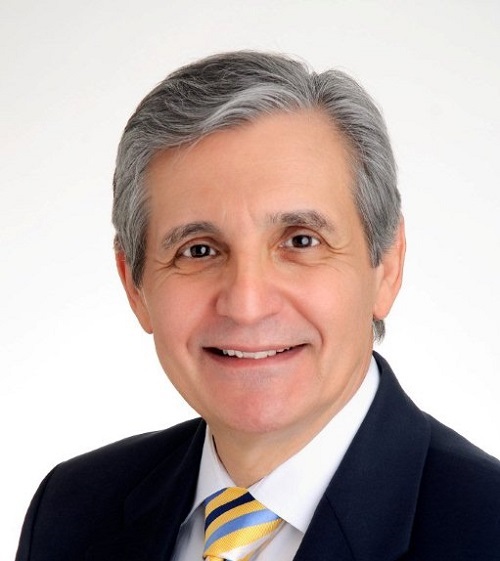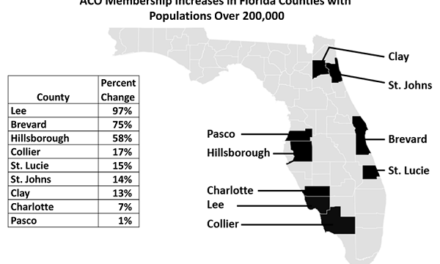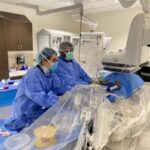By Arthur E. Palamara, MD, FACS
In March or April, 1300, as he wandered through the underworld, Dante finds himself in a dark woods. Losing his way, he has to face monsters from classical mythology. As he wandered further into the underworld, he faces leopards, wolves, and a lion. He is driven back into a dark place into which the sun does not enter. Dante meets his guide, Virgil, the Latin epic poet who will lead him out. Dante hesitates. Virgil explains that he was sent by Beatrice, the symbol of divine love, Santa Lucia, the symbol of Grace, and Rachel, the symbol of contemplative life.
Dante then passes through the gates of hell which bears the inscription “abandon hope, ye who enter here.” Dante and his guide Virgil, hear the anguished screams of the uncommitted, the opportunists – who were out only for themselves, and the cowards. These miscreants wander around naked in pursuit of their own ever-changing self-interest.
Dante wrote this epic poem to describe the punishment for sins, immorality, and transgression of the people and politicians of 14th Century Florence. While no one would suggest that Covid-19 is a result of moral turpitude, what doctors and nurses face daily, is no less traumatic.
Walking into the ICU corridor, one is confronted with an imposing series of long, shiny, aluminum vent pipes that appear more suited to a factory than a hospital. They are intended to carry aerosolized viral particles to the outside where they will be diluted and neutralized by the sun. The pipes are immediately discordant and jarring, although, after a while, one becomes oblivious to them.
The doors of the individual units are closed, on which signs are hung that provide warning to the unbidden. Slowly opening the door, the nurse or physician enters a surreal world of gray, blue, and beige, soothing colors that do little to dispel the gloom. Gone is the incessant chatter of nurses, respiratory techs, doctors who formerly would be going about the business of recuperating patients in various stages of illness. The silence of oppressive. Oppressive because unlike previous ICU cases where the vast majority of patients would survive, few occupants will recover.
On one side, are the closed doors of cubicles. Holes have been cut into the doors through which pass various tubes connecting the patient to IV pumps and other paraphernalia, allowing adjustments without entering the patient rooms. This minimizes staff contact with patients and lowers their potential for contracting the virus. On a wall, seen only by staff, is a white board posting the names of the patients. Room 1 on top and 8 on the bottom. Next to their name are symbols. “V” stands for ventilator. “T” stands for tracheostomy. A red dot, “DNR” or do not resuscitate. The family or the patient has made the decision that if their heart stops, they will not receive cardiac massage and often futile measures ICU doctors use to preserve life.
Looking though the glass, the patient’s unmoving head and upper torso is seen. Their chest rising and falling with the mechanical rhythm of the ventilators. Others have an enhanced type of nasal cannula that are capable of delivering higher flows of precious oxygen. Their breathing is more spasmodic: they must work harder to supply their bodies with that essential ingredient necessary to maintain cellular activity. When it falls too low, a tube is placed in their windpipe and a machine takes over. Once this occurs, their chance for survival is around 10%. And even if they do survive, they likely will experience profound medical and emotional scars.
What is different from our experience a year ago is the color of the patients’ hair. A year ago, it was gray. Now it is brown. Many men sport beards and upper torsos that look formidable and robust. Except for the tubes protruding from their nose, mouth or neck, they look like they could pull out their IV, pack up their belongings and walk out of the hospital. It is unlikely that they will.
This past week, a nurse was observed to be crying softly. The day before, as her patient’s condition worsened, his family came in. They knew that they were probably saying good-by. The patient was alert and responsive enough to have personality and bonded with the nurse. She came in at 7:00 the following morning and learned that he had expired. Her humanity deserves respect in that she had continued to regard him as a human being. More often than not, the only way for healthcare professionals to survive is to depersonalize their charges and regard them as “cases.” To her credit and pain, she had not. Magnifying the loss was the patient’s widow and 3 young children. He was in his late 30s.
The scene was replayed the following day. This time a pregnant mother with severe COVID symptoms was flown in. Over the course of several days, her condition deteriorated. To try to preserve her life and that of her unborn child, a hysterectomy was performed. The child survived, but the mother did not.
She left behind several small children at home as well as her newborn child who will never enjoy her mother’s hugs or kisses. The emotional effect on her caregivers exceeds description.
What these cases have in common is the fact that neither of these patients were vaccinated. Nor are more than 99% of the other cases in the ICU.
At the end of Dante’s Inferno, his Purgatorio, is a passage from his female friend Casella: “As I once loved you in my mortal flesh, without it now, I love you still.” Why 700 years later should this be necessary? Why should the surviving wife or husband have to love only the memory of their lost spouse? Dante, in the end, was a poet of hope. As we have hope that our burden will soon end.
America has overcome 9/11, depressions, recessions, wars, and severe adversity. We will doubtlessly overcome this pandemic. Life will again one day become normal. But we need to lower the number of casualties. We have the ability. We stopped smoking. We use seat belts. We have the means to do so. Creation of the vaccine in less than a year is a miracle in itself!
There is only so much pain and suffering that the psyche of health givers can endure. And they (we) have given themselves selflessly for over a year and a half. While there is no Virgil to lead us out of hell, there are vaccines. There are masks. There is simple distancing. To those who deny the reality of the pandemic and its morbid consequences, I ask: please help us. Use those measures to keep yourself and others healthy.
Dr. Arthur E. Palamara is the Past President of the Broward County Medical Association and a vascular surgeon in Hollywood, FL.




























